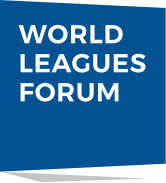
Interview
Jérôme Perlemuter
How to ensure a global voice
“Having football fully back is also part of having our life back.”
In this exclusive interview, the General Secretary of the World Leagues Forum (WLF), Jérôme Perlemuter, explains that the organisation’s modus operandi shifted from day-to-day activities to helping leagues and members overcome the crisis.
Perlemuter feels that the WLF has established itself in world football and can now work more intensely on tackling topics such as governance, financial control and the use of technologies.
“One of the challenges for the WLF is to ensure that governing bodies consider and recognise the importance of domestic leagues and their member clubs in the football arena,” says Perlemuter.
As the General Secretary of the World Leagues Forum (WLF) since 2017, Jérôme Perlemuter has steered his organisation through one of football’s darkest ages. The WLF helps improve governance structures within the global game and represents leagues and their member clubs before sporting and political institutions.
At the beginning of the global health crisis, countries, leagues and clubs went into lockdown, and by the time the sport slowly sputtered back into action, the landscape had dramatically changed.
“All clubs and leagues were deeply affected by the economic crisis originating from the pandemic,” reflects Perlemuter. “Clubs and leagues that relied on transfers, on fans attending matches and on other sources of revenue were significantly impacted in their finances, bringing them to the brink of bankruptcy. And this impact will continue to be felt over the coming years. Fortunately, vaccines are working against the many variants that currently exist; these will help us to get our football back. People must overcome the crisis and enjoy life again. Having football fully back is also part of having our life back.”
It is a message of hope from Perlemuter after the pandemic prompted the WLF to intensify its activity, rising to an unprecedented challenge and seeking to find solutions alongside football’s other major stakeholders, including FIFA. The organisation’s modus operandi shifted from day-to-day activities to helping leagues and members overcome the crisis.
“Solutions had to be found to get football back in the context of a pandemic,” explains Perlemuter. “Innovation and creativity were key to achieving resiliency. The WLF helped leagues to exchange expertise concerning the best possible solutions when it comes to hygiene protocols and relations with players. For the WLF, the exchange of information and advice was a key element that helped overcome the pandemic. We also continued to work with FIFA on appropriate amendments to football regulations.”
In 2021, the WLF has resumed its normal agenda, allowing Perlemuter and his team to focus on long-term projects under the direction of Chairman Enrique Bonilla, the former President of Liga MX in Mexico. The organisation’s statutes provide that the chair alternates between Europe and the rest of the world.
“The idea is for our organisation to be balanced and have a truly global perspective,” says Perlemuter. “The WLF is a young organisation. The first three to four years were mainly used to position the WLF in the football landscape; we believe that this has been achieved. Currently, the perspective is to launch a common project with leagues, as well as to provide services to our members. We are trying to help developing leagues to have a better structure. There are many areas that we are working on: governance, financial control and use of technologies, among others.”
The fight against discrimination is another field in which the WLF is helping leagues to exchange best practices and explore common projects. In 2019, it set up a task force against racism to that effect. The WLF will also soon be releasing a report on women’s football – for which the organisation partnered with former FIFA Council member Moya Dodd – focusing on best practices to promote the women’s game.
Those initiatives demonstrate that, while the WLF has grown, the organisation is still building its voice for the future. With 42 leagues as members, the body has an excellent and far-reaching platform to help shape the game, with concern for player welfare a priority in an industry that churns and turns ever faster.
“One of the challenges for the WLF is to ensure that governing bodies consider and recognise the importance of domestic leagues and their member clubs in the football arena,” concludes Perlemuter.
“Most of the football industry lies in domestic competitions. There are 4,000 professional clubs and 130,000 professional players around the world. These clubs are the ones that educate and develop players and set the structure and path for them to become the stars of tomorrow. Even though all these players are professionals, most of them do not necessarily have high salaries or play for their national teams. Every single player and every club is meaningful and essential.”







